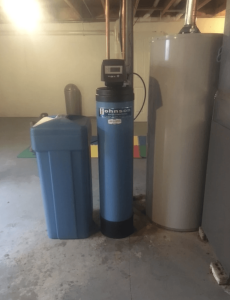The Importance of Choosing a Properly Sized Water Softener: Insights from a Pentair Water Softening Company in Downers Grove, Illinois

When choosing a water softener, it’s essential to make sure the system fits your household’s actual needs. You don’t want to get one that is either too small or too big. Below, this Pentair water softening company in Downers Grove, Illinois is going to share some tips on how to get your water softener sizing right.
What is grain capacity?
Grain capacity tells you how much hardness a softener can remove before it needs to regenerate or clean itself.
Water hardness comes from minerals like calcium and magnesium in your water. These minerals clog pipes, leave residue on fixtures, reduce soap effectiveness, dry your skin, and shorten the life of appliances.
Water hardness is commonly measured in grains per gallon. One grain equals about 64.8 milligrams of calcium carbonate, or around 17.1 parts per million.
You will see softeners listed as 32,000- or 40,000-grain systems. That number shows how many grains of hardness the system can handle before needing to regenerate. But these numbers are based on perfect lab conditions, not real homes.
In real-world settings, where water pressure, temperature, and flow can be very different, a softener labeled 32,000 grains may perform closer to 30,000.
What happens when a softener is too big?
When a softener is too large, water can sit in the tank too long between regeneration cycles. That water can lose its freshness, taste strange, or develop a smell. Stagnant water is also a breeding ground for bacteria.
If you install a 60,000-grain softener but only need 30,000, you will not get better results. You will only be wasting salt and risking water quality issues.
The right-sized softener avoids all of this. It regenerates regularly, keeps the water fresh, and uses salt and water more efficiently.
What if the softener is too small?
An undersized softener has the opposite problem. It fills up fast and regenerates more frequently, sometimes every day. This frequent cycling uses more salt and water, increases your utility bills, and wears out the resin beads inside the softener faster.
If your household uses more water than the softener can handle, you will also notice hard water breaking through during busy times. That defeats the purpose of the softener.
Regeneration should happen every few days or weeks, depending on how much water you use and the water’s hardness. If the softener is too small, it can’t keep up. Over time, this adds to maintenance costs and shortens the life of the softener.
The softeners offered by a Pentair water softening company in Downers Grove, Illinois, like Johnson Water Conditioning, use demand-initiated regeneration. These softeners track your actual water use and only regenerate when needed. That keeps regeneration efficient, avoids waste, and helps the system last longer.
How to size your softener correctly?
Start by estimating how much water your household uses. The average person uses around 82 gallons per day. So, for a family of four, that is about 328 gallons daily.
Next, multiply your total daily water use by the hardness level in grains per gallon. For example, 300 gallons a day at 10 GPG equals 3,000 grains per day.
Multiply again by seven to get your weekly needs. That will be 21,000 grains. And for that, a 30,000-grain softener would be a good match. It would likely regenerate once a week, which is ideal.
A professional Pentair water softening company in Downers Grove, Illinois will test your water, check your actual water usage, and help you choose the right softener capacity.
Looking for a Pentair Water Softening Company in Downers Grove, Illinois?
Ready to upgrade your system with the help of a professional Pentair water softening company in Downers Grove, Illinois? If so, Johnson Water Conditioning is just a call away. Our technicians will size your system accurately and install it professionally. Contact us today to schedule an appointment.

 Better Water for
a Better Life
Better Water for
a Better Life
